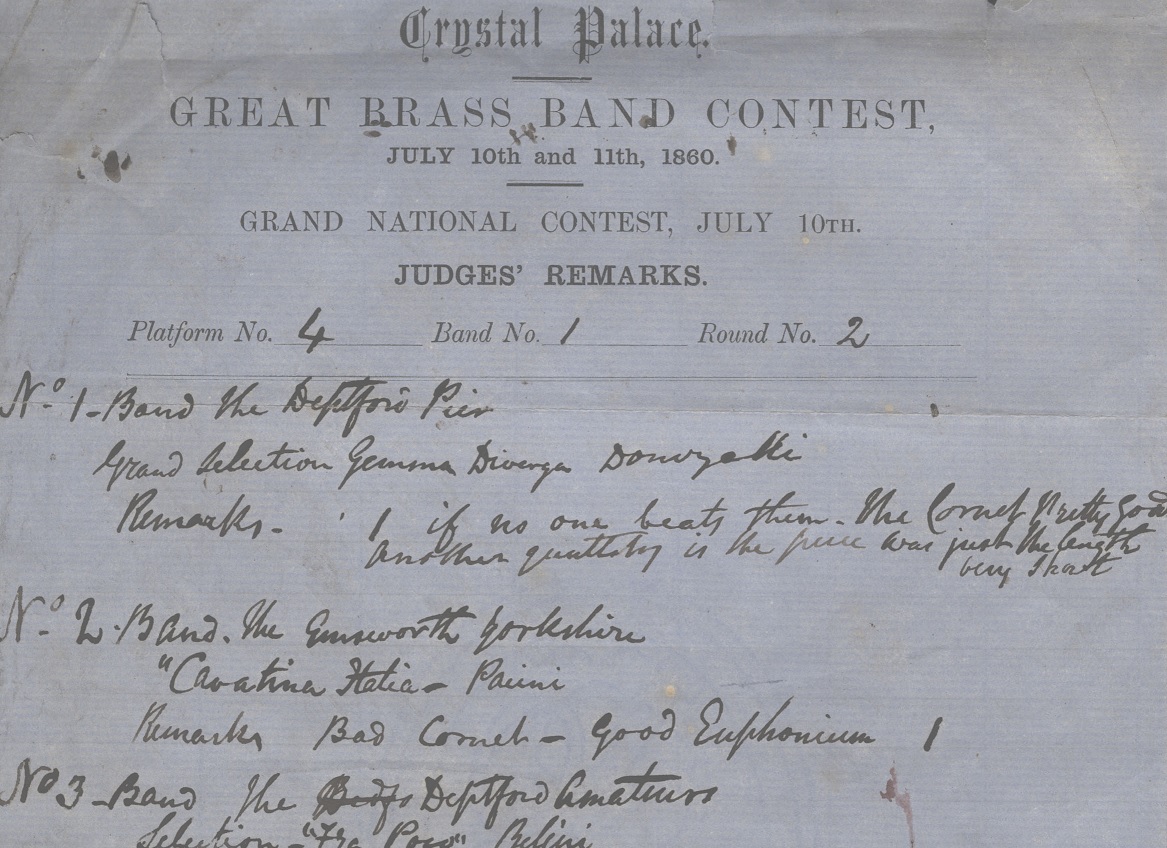
In the third part of the series of articles written for 4BR, Director of Mode for… writer, musician, mental health first aid instructor and advocate Tabby Kerwin looks at the importance of gaining awareness about mental health issues within the brass band movement with the prism of focus on the adjudicator.
Part 3: Mental Health in Brass Bands… Adjudicators
Who would want to be a brass band judge or adjudicator?
Like referees in football, theirs is a thankless task - officiating in making subjective decisions that can never please everyone in a contest environment fuelled by emotion.
We enjoy a curious relationship with the person in the ‘box’ (and sometimes out of it); one based on a form of professional trust in our amateur pursuit of an intangible outcome: competitive music making.
Understanding
It is probably fair to say we’ve all at some time respected or dismissed their opinions, loved or hated their remarks, supported or questioned their results.
However, without them we simply cannot undertake a central part of what we do as brass band musicians.
That is why we need to understand the pressures as well as expectations we place in them. However, they in return have to do the same.

The key to understanding what cannot be seen...
In the last article on conductors, we discovered that a two-way street exists in terms of the duty of care to mental health well-being between the person at the helm and the ensemble they direct. It is the same with adjudicators and bands.
Adjudicators have in their power the ability to inspire and enthuse through comment and opinion. Conversely they can also cause anguish and upset.
Responsibility
It is a task that comes with inherent responsibility – and at times with the ability to fundamentally change the outlook and life of an amateur musician.
It is therefore a role that must be undertaken with an acute appreciation of mental health issues - and especially that of where a contesting participant may be on their own mental health continuum.
As such the adjudicator needs to be mindful of this fact and that the language they use (especially directed at an individual within a performance) can have a huge impact away from an immediate moment on the contest stage.
As such the adjudicator needs to be mindful of this fact and that the language they use (especially directed at an individual within a performance) can have a huge impact away from an immediate moment on the contest stage.

Written remarks need to be constructive as well as incisive
Language key
That use of language is key - be it written in remarks, or in the oral analysis when speaking from the stage: It needs to be constructive and honest in critical insight, yet remain positive and respectful in general outlook.
Consideration must be given to who they are writing about - or should that be whom they are writing to?
For instance, if an adjudicator personalises their written remarks towards ‘a person’ as opposed to a ‘band’s effort’ it can build a level of respect and understanding (the vast majority of judge’s are former players).

A fine adjudicator is one that appreciates skill and talent, but also one that considers that at a particular moment in time, under pressure and with increased levels of performance expectation, a player may encounter unexpected difficulties on a contest stage.
How the adjudicator addresses these issues is also key. Be constructive in critical analysis and even offer advice (especially at youth and lower section levels) and a player will respect the opinion.
Being destructive and simply listing obvious faults serves no purpose.
Social media comment
In its own way the same applies to the performer’s appreciation of the adjudicator’s role and their mental health well-being.
In the era of immediate social media comment - simply ranting about the unfairness, competence or honesty of an adjudicator can also have far reaching consequences.
There is nothing wrong with questioning in a constructive manner to gain a winder understanding of a decision made – but what purpose does it serve if it is stated in the language of abuse?
There is nothing wrong with questioning in a constructive manner to gain a winder understanding of a decision made – but what purpose does it serve if it is stated in the language of abuse?

The age of social media comment is upon us...
Postive reaction
Like performers on stage, judges are also on their own mental health continuum.
They are of course aware that for every positive reaction to their findings and results there will be negative ones as well. If a judge has approached their task in a constructive manner, their opinion deserves to be treated as such in return (even if you totally disagree with it).
Giving respect commands respect and that’s how this two-way street needs to work when we’re considering the mental health of both competitor and adjudicator in a competitive brass band environment.
Whether we are a player, conductor or judge, we have a personal responsibility to continually learn and develop in order to better ourselves and the brass band movement as a whole.
Ongoing dialogue
An ongoing dialogue of understanding and awareness of mental health issues will in turn bring a growing appreciation of how its effects performers and adjudicators alike.
Talking about performance issues raised at contests can be done in a manner that is respectful and constructive - rather than simply resorting to the age old age of dismissing a judge’s opinion as worthless. They never are.
Unless we do that contesting outcomes can become a corrosive element towards poor mental health well-being - hurtful and unwarranted.
Talking about performance issues raised at contests can be done in a manner that is respectful and constructive - rather than simply resorting to the age old age of dismissing a judge’s opinion as worthless. They never are.
A contest result (good or bad) can have a massive impact on our mental health - positively and negatively.
As a player it is important to understand how the decision of the adjudicator has been reached, and how it can be used in a positive manner for the future. Immediate emotions should be left to pass.
It is the same for the adjudicator; the immediate impulse to criticise a mistake in damning fashion is not helpful or constructive – a considered response is.
The player will know that they haven’t played well. It would serve no purpose at all to crush their enthusiasm and confidence not to try again.
Tabby Kerwin
Mental Health in the Bandroom: Part 1
Tabby Kerwin looks at the importance of gaining awareness and education about mental health issues within the brass band movement.
https://www.4barsrest.com/articles/2020/1850.asp
Mental Health in the Bandroom: Part 2
Tabby Kerwin looks at the importance of gaining awareness and education about mental health issues within the brass band movement — this time with an emphasis on the role of the conductor.
https://www.4barsrest.com/articles/2020/1867.asp
The Author:
Tabby Kerwin is a trained Mental Health First Aid (MHFA) instructor and also runs a series of mental health awareness workshops for bands, conductors and adjudicators.
Tabby’s book ‘The Three Ps: Possibility, Productivity & Performance’ is available from the Mode for… website or on Amazon.
Her new book ‘The Three Taboos: Cancer, Grief & Mental Health’ will be published in 2020.
Brass on The Mind Facebook Group at www.facebook.com/groups/brassonthemind
Mode for… http://www.modefor.co.uk
The CD ‘Lago – The Music of Simon Kerwin’ can be purchased at http://www.modeforpublishing.com with a donation from sales going to Bexley Wing, Leeds Cancer Centre, St. James’ Hospital. Also available on iTunes, Apple Music and Amazon Music.











